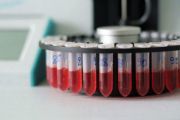Experimental GLP-1 Receptor Agonist Associated with Better Glucose Control and Weight Effects than Sitagliptin and Glimepiride
Results of a three-year trial of the experimental GLP-1 receptor agonist albiglutide showed that it had a better effect on HbA1c, fasting blood glucose, and body weight than two comparator drugs.

Interim results of a three-year trial of the experimental GLP-1 receptor agonist albiglutide showed that it had a better effect on HbA1c, fasting blood glucose, and body weight than two comparator drugs, according to a presentation from the annual scientific sessions of the American Diabetes Association in Chicago.
“Albiglutide is a new, experimental product which uses a hormone secreted by the gut when we eat to control diabetes and hyperglycemia,” said Bo Ahren, MD, PhD, who is associated with Lund University in Lund, Sweden. “This agent is coupled with albumen, a protein that it takes the body a long time to get rid of, so it has a half-life of about five days, allowing individuals to inject it only once weekly,” explained Ahren, who presented poster 52-LB, “HARMONY 3: 104 Week (Wk) Efficacy of Albiglutide (Albi) Compared to Sitagliptin (Sita) and Glimepiride (SU) in Patients (pts) with Type 2 Diabetes Mellitus (T2DM) on Metformin (Met).”
HARMONY 3 is a three-year phase III clinical trial comparing albiglutide with sitagliptin and glimepiride in patients already receiving metformin; interim two-year results were presented in the poster.
In the study, patients with type 2 diabetes who were receiving metformin were randomized, and 302 patients assigned to the 30 milligram albiglutide arm, 302 to sitagliptin, and 307 to glimepiride. An additional 101 patients received placebo.
Albiglutide met the primary endpoint, which was HbA1c change at 104 weeks. Patients started with an HbA1c of 8.1%, which the experimental agent decreased by 0.91% more than placebo (p < 0.0001), by 0.35% more than sitagliptin (p < 0.0001), and by 0.27% more than glimeperide (p = 0.003).
At week 104, patients in the albiglutide arm had HbA1c of 7.5%, compared to 7.8% in the sitagliptin and glimepiride arms. Albiglutide was superior to glimepiride (p = 0.0033), and it was both non-inferior to and superior to sitagliptin (p = 0.0001).
“In studies like this, some participants stop treatment, and we take the last value for that participant in further analysis,” explained Ahren. About 68% of patients in all three arms continued the trial to week 104, according to the poster.
Patients in the albiglutide arm also had lower fasting blood glucose levels than patients in the other arms. It was lower than placebo by 27.7 milligrams per deciliter, lower than sitagliptin by 15.5, and lower than glimepiride by 10.1 mg/dL (p < 0.05).
Weight loss was similar in the albiglutide arm to that in the sitagliptin arm, and greater by 2.4 kilograms than for those participants in the glimepiride arm (p < 0.0001).
However, adverse events, including injection site reactions, were more common among those receiving the experimental agent, with 17% of those in the albiglutide arm experiencing them, compared to 8% of those on glimepiride and 6% of those on sitagliptin.
Of patients on glimepiride, 6% experienced vomiting, compared to 4% in glimepiride and sitagliptin, according to the abstract.
In the albiglutide arm, two patients were identified as having pancreatitis. One patient on albiglutide developed thyroid cancer, while two patients treated with sitagliptin developed thyroid cancer, according to the poster.
As for hypoglycemia, 3% of patients in the albiglutide arm developed documented hypoglycemia, compared to 2% of those on sitagliptin and 18% of those on glimepiride; however, there were no severe hypoglycemic events, according to the abstract.